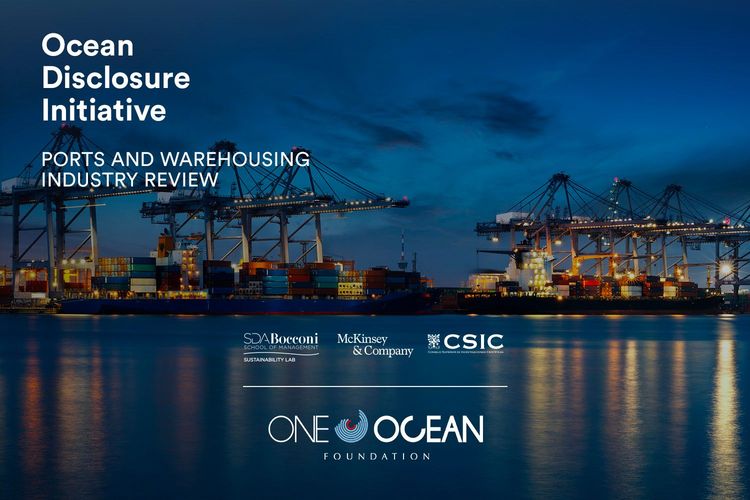
Ports and warehousing are among the cornerstones of global trade, serving as crucial hubs for the movement of goods and commodities across the world. As key entry and exit points for maritime traffic, ports have significant impacts on marine ecosystems.
In this report – conducted in the framework of theOcean Impact Initiative project - we explore the pressures of port operations on the ocean and highlight some of the best practices to mitigate its environmental footprint.
DOWNLOAD THE REVIEW
The pressures of Ports & Warehousing on the ocean
The pressures exerted by ports and warehousing activities on the ocean are multifaceted and present significant environmental challenges. From emissions to chemical contamination, these impacts pose a threat to marine ecosystems and coastal communities.
Firstly, ports are hubs of activity, relying on various vessels, equipment, and facilities to facilitate trade and commerce. However, this activity comes at a cost, as the burning of fuels by ships and machinery emits greenhouse gases (GHGs) and other air pollutants into the atmosphere. These emissions contribute to global warming and air quality degradation, impacting both marine and human health.
Moreover, chemical contamination poses a persistent threat to oceanic ecosystems. Wastewater discharges from ships, accidental spills, and the cleaning of hulls and propellers introduce a myriad of pollutants into marine environments. These chemicals can disrupt marine life, contaminate seafood, and degrade water quality, posing risks to both ecological balance and human well-being. The accumulation of offshore garbage in ports presents a pressing issue: without proper management practices, ports can become hotspots for marine debris, which can ultimately find its way into the ocean.
Additionally, port activities such as dredging and sand extraction for construction purposes can have detrimental effects on seafloor integrity. Dredging operations disrupt marine habitats and ecosystems, while the disposal of dredged materials can smother benthic organisms and alter sediment composition. Sand extraction further exacerbates these impacts, leading to habitat loss and coastal erosion.
Sustainable strategies to mitigate the environmental impact of Ports & Warehousing
As awareness of the pressures is increasing, the concept of “green ports”, which are characterised by a more conscious use of resources, low energy consumption and low pollution, is gaining popularity.
According to this industry review, there are potential solutions to mitigate the environmental impacts of ports & warehousing, including:
1) Electrification of the port operations and using alternative fuels could decrease GHG emissions and air pollution from the sector.
2) Implementation of an integrated monitoring system that detects water and sediment quality in and around the port area could reduce water contamination.
3) Application of a “waste hierarchy” method together with recycling activities and introduction of collecting devices for floating garbage near ports to decrease marine litter problem.
4) More sustainable ways of disposal and reuse of dredged materials and excavation methods to minimize suspension of sediments and destruction of benthic habitat.
This review underscores the commitment of One Ocean Foundation to foster sustainable growth of Ports & Warehousing Industry while preserving the fragile marine ecosystems.


